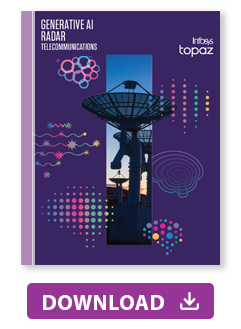Insights
- Generative AI spending is growing far slower in telecommunications than the overall trend.
- 45% of telecom companies are implementing, have implemented, or have created business value from generative AI use cases.
- A focus on user experience and personalization underlines the difference between this consumer-facing industry and the overall trend.
- Telecommunications expects generative AI to have a positive impact on business areas like revenue, business model, talent, reputation, profit, and cost efficiency.
- Telecom companies rank ethics and bias concerns as the top barrier to generative AI adoption.
- Telecoms are more ambivalent about their team’s readiness to adopt generative AI.
- The chief operating officer is the main sponsor of generative AI for more than a quarter of telecom companies.
This year will bring further developments in generative AI as organizations familiarize themselves with this transformative technology. So where are they now?
Through this study we aimed to uncover how companies use generative AI, how much they spend on it, how it’s being rolled out, and where it makes an impact. We looked at 3,000 companies across 12 industries:
- Automotive
- Consumer package goods
- Energy, mining, or utilities
- Financial services
- Healthcare
- High tech
- Insurance
- Life sciences
- Logistics or supply chain
- Manufacturing
- Retail or hospitality
- Telecommunications
Many companies told us they are already spending significant sums of money - and are set to spend more this year. However, this pattern isn’t the same across sectors. In this data book we highlight how telecommunications compares with the rest of the pack.
Generative AI spending
Generative AI spending is growing far slower in telecoms than other industries
Spending by telecoms is set to grow by 32% in 2024 – Telecoms spent $179 million on generative AI in 2023. This is projected to grow to $237 million in 2024.
Generative AI spending growth in telecoms lags most other industries – Spending on generative AI is expected to grow by only 32% in the next year. This is among lowest growth across the 12 industries we surveyed.
Telecom generative AI spending
Expected generative AI spending growth in 2024 by industry
Generative AI adoption
45% of telecom companies are implementing or have generated business value from generative AI
Nearly all telecom companies have started their generative AI journey – 89% of the industry has started experimenting with generative AI. Nearly 10% has use cases that generate business value.
Most telecoms are experimenting with generative AI – A higher percentage (45%) of telecom companies are experimenting with generative AI than the overall sample.
Generative AI adoption by proportion of respondents
User experience drives generative AI optimism for telecoms
Focus on users underlines difference between this consumer-facing industry and others in our research
Telecom companies are more optimistic about user experience – 54% of telecoms believe generative AI will have the biggest positive impact on user experience and personalization – much higher than the overall trend (31%).
Where companies expect generative AI to have the most impact
Telecoms are upbeat about the impact of generative AI
Respondents expect a positive impact on business areas
Broad optimism in line with other sectors – Respondents were generally positive on the type of impact generative AI would have on business areas like revenue, business model, talent, reputation, profit, and cost efficiency. Telecommunications respondents held roughly the same sentiment.
Expected generative AI impact on business areas by proportion of respondents
Obstacles to generative AI adoption
Telecom companies rank ethics and bias concerns as the top barrier to generative AI adoption
Ethics and data privacy top list of challenges – 35% of telecom companies ranked ethics and bias as their key challenge to generative AI adoption, compared to 21% of the overall survey.
Telecoms much less concerned with data usability – Only 11% of telecom respondents reported data usability as their top obstacle to generative AI adoption, half that of the overall sample.
Obstacles to generative AI adoption by proportion of respondents
Workforce generative AI readiness
Telecoms are more ambivalent about their team’s readiness for generative AI
Telecom firms align with other sectors on levels of positivity and ambivalence – Telecommunications is significantly more ambivalent about workforce generative AI readiness than our overall sample (41% vs. 28%).
Sentiment on workforce readiness to adopt generative AI by proportion of respondents
Primary sponsor of generative AI initiatives
The chief operating officer is the main sponsor of generative AI for more than a quarter of telecoms
COOs sponsor generative AI in the telecom industry more than the overall trend – 27% of telecom companies report that the COO primarily sponsors generative AI, compared with only 9% of our total sample.
Fewer telecom CIOs are the primary sponsor of generative AI – In 29% of companies, the CEO is the primary sponsor of generative AI. In telecoms, only 14% reported the same.
Primary sponsor of generative AI initiative by proportion of respondents
Primary generative AI policy maker
Generative AI governance is less likely to come from telecom CIOs
CIOs in telecoms govern generative AI less than CIOs in other industries – Only 14% of telecom CIOs primarily own these regulations and policies for their company, compared with 25% in the overall trend.
However, telecom product owners take the lead more often – 21% of telecom companies reported that product owners take the lead on generative AI governance, compared with 14% of the total sample.
Primary generative AI policy maker by proportion of respondents















